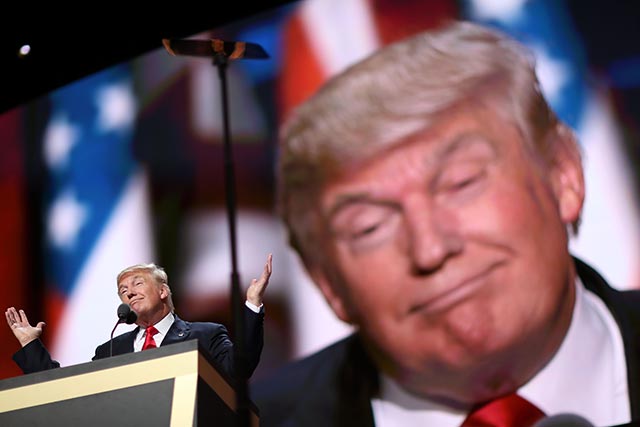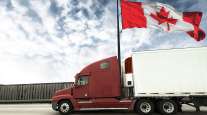Analysis: Two Experts Envision Trade Under President Trump — Goodbye, Wal-Mart

 Daniel Acker/Bloomberg News
Daniel Acker/Bloomberg NewsDonald Trump threatens to revoke the North American Free Trade Agreement and impose stiff tariffs on imports from China or products made by U.S. companies abroad. Hillary Clinton opposes the pending Trans-Pacific Partnership that President Barack Obama negotiated. And on Aug. 28, Germany's economy minister said free trade talks between the European Union and the United States had failed.
With open trade in such bad odor, that raises the question: What would the U.S. economy look like without the trade deals of the past 70 years?
To find out, Bloomberg View Editor Paula Dwyer asked former U.S. Trade Representative Robert Zoellick and economist Tyler Cowen, a View columnist. They agree that companies, consumers and workers would see dramatic changes — none good. They began by talking about the powers that U.S. presidents have to revoke existing agreements or change tariffs. And they concluded that, in a Donald Trump administration, Apple might survive, but Wal-Mart probably couldn't. Here's a lightly edited transcript of the Aug. 12 conversation.
Dwyer: How much authority does a president have to revoke trade treaties and set tariffs?
Zoellick: The president's authority is quite extensive. For the U.S.'s first 150 years, setting tariffs was one of Congress's major jobs. The last time lawmakers did that was in the Tariff Act of 1930, more commonly known as the Smoot-Hawley tariffs. Those were very high tariffs. And that remains the statutory tariff system of the U.S.
In 1934, Congress started giving the president authority to negotiate those tariffs — to lower or raise them — as part of a new process of making trade agreements with countries.
If you ended all those agreements, the tariffs revert to the Smoot-Hawley levels, which many economists associate with the cause of the Great Depression, along with monetary policy.
In addition, there is something called the International Emergency Economic Powers Act of 1977, which gives the president broad authority to take emergency action to block all sorts of goods coming into the U.S. or to take financial measures.
And that would be relevant because, if the president wanted to target, for example, U.S. companies that moved abroad, as Trump has said, there could be a legal basis for this.
Dwyer: That's pretty scary. Trump talks about tariffs as high as 45%.
Zoellick: Yes, it is indeed scary. The wave effects of hiking tariffs, which are just taxes on trade, are potentially enormous. The first effect would be in the financial markets, which are going to go nuts. They're going to see it as a return to the isolationist policies that killed growth around the world.
Other countries will soon retaliate. And about 50% to 60% of imports to the U.S. are intermediate goods. Take steel, for example. If you raise steel prices by 30% or 40% because of tariffs on steel imports, auto companies and others who use steel are going to have to pay higher prices, and that's going to raise the cost of cars.
The U.S. economy is now closely integrated with Canada and Mexico because of Nafta. Every dollar of Mexican exports around the world has about 40 cents of American product. For Canada, it's about 25 cents. So if you shoot the Mexican economy, you're also blowing up American production.
RELATED: Trucks continue to haul most Nafta freight by value, DOT says
The auto industry has a very integrated structure with components, parts and assemblies going across the three borders often six or seven times before a car is completed. You're trying to reverse 80 years of economic liberalization that most people believe is very important for promoting U.S. and global growth.
Cowen: I expect a somewhat slightly more optimistic scenario. I think a President Trump would give us a reality-TV version of a tariff hike. I don't necessarily think he wants to experience the pain of tariffs going up, markets crashing and all the political fallout early in his time in office.
Yet he's promised he would do something, and he loves to spar with people and claim he's being done wrong and rail against elites rather than own problems and solve them. So I think what he would probably do is announce that he had abrogated these treaties, not actually do it. There would be a very high level of uncertainty, but I don't think the laws on the books would necessarily change.
The biggest thing at stake here is uncertainty. Under all of these scenarios, the real impact would be on services, which often rely more on the regulatory system. Uncertainty would result in a higher implicit tax on exports of services to the U.S. than on exports of goods.
Zoellick: I think that's an extremely optimistic interpretation. Remember, he has the authority to act. He can raise tariffs and create havoc.
I agree on your uncertainty point, but I think you may be a little blithe about the risk to markets. Other countries aren't just going to stand for the U.S.' blustering.
 Andrew Harrer/Bloomberg News
Andrew Harrer/Bloomberg NewsThis is serious stuff. I worked on German unification. I've done a bunch of trade deals. I've had some experience internationally. If you act the way Trump talks, you're going to pull down a 70-year-old system that got us out of the Great Depression and helped the U.S. become the strongest economy in the world. This isn't for fooling around with.
Cowen: I agree it would be a disaster, but I'm not sure we would end up with tariffs at 45%. So I can imagine a bill put before Congress to bring tariffs to something like their current level. At first, it fails. Then the stock market tanks. Maybe there are the beginnings of a financial crisis. And then Congress passes the thing.
I also could imagine an outcome where he ends up just raising tariffs on China, or picking out one or two enemy countries and claiming that as a victory.
Zoellick: When you talk about raising tariffs with China, do you think China is just going to sit there and not raise tariffs on U.S. products or block U.S. products? You're going to get a whole series of effects. And one more thing to keep in mind is that Trump's goal seems to be to have a trade surplus. Well, we had a trade surplus during the Great Depression.
Cowen: Yes, it's not that hard to get a trade surplus. All you have to do is wreck your economy. You don't buy anything from other countries, which is what we did in the '30s. And so we could achieve Trump's goal that way.
Dwyer: If a tariff on imports is like adding a sales tax, what would the effect be on consumers?
Zoellick: It depends on whether people can buy alternative products. It depends how much people want that product. As a consumer, if you want to pay another 25% or 40%, then vote for higher tariffs.
Americans want to have choice and also pay less for goods. You see poll questions that say people would be willing to pay more for U.S.-made goods. And maybe they would, in theory. In practice, you have to look at what they buy and what they do as consumers, which is a little bit different.
For a lot of what we're talking about — textiles, toys, electronics — I don't think that higher tariffs would necessarily regenerate those industries in the U.S. It would mean you'd buy it from another country. Already, a lot of the low-wage Chinese production is moving to other countries in Southeast Asia and other places. So if Trump raises tariffs on one country, that isn't going to change production patterns in the U.S. It will just divert the overall trade structure to other countries.
Keep in mind that a lot of the goods we're talking about are bought more by low-income people. If you charge more for food, school supplies, clothes and toys, that's the same as a regressive tax.
Now, the other approach would be to raise tariffs on all countries. But then you are really going to have a more costly set of taxes. The Peterson Institute for International Economics analyzed the effects of lower prices, plus the income effects from reducing trade barriers from various agreements over the past 20 years or so. And they found that households save about $10,000 a year.
Dwyer: Would Apple be able to continue assembling iPhones in China and then bring them into the U.S.?
Cowen: They could. There are plenty of cases where, say, a currency moves by 35% over a number of years. And that currency move is like an attack from the point of view of the exporter. It hurts profits terribly, and it can be very destructive. But in the short run, you often see companies just swallowing it.
So I don't think we'd wake up the next morning and no one could get an iPhone. I think the long-term effects would be extremely corrosive. The uncertainty effect would perhaps be larger than the tariff effect. It would be a disaster, but in terms of the world around you a week later, I don't think you'd notice that big a difference.
The effect on Wal-Mart and Apple would be quite different. Apple has unique products, and a lot of its buyers are willing to pay higher prices. I have an iPhone. If it costs me $300 more, I would still buy another iPhone. Not everyone would do that, but Apple has a lot of room to eat part of the new tax itself and raise prices. Its core business model can persist.
Wal-Mart, though, has sold customers on the notion of always lower prices. So I think it's hard to imagine a Wal-Mart convincing people to buy the same goods at higher prices.(Wal-Mart ranks No. 3 on the Transport Topics Top 100 list of the largest private carriers in North America.)
We also buy from China a lot of minerals and rare earth materials, which have significant military uses. The pressure from the military on Trump not to disrupt that would be extreme. How he would respond to that, I don't know. But I think that's another part of the equation.
Dwyer: So it sounds like both Wal-Mart and Apple could manage, though it would be harder for Wal-Mart?
Cowen: Wal-Mart has been losing a lot of business already for other reasons. They cannot survive as a high-priced retailer. I'm not saying they would go bankrupt the next day, but in the long run a lot of what Wal-Mart does just wouldn't make sense.
Dwyer: What are the chances that Apple or any company that does a lot of manufacturing or assembly in Asia would shift that to the U.S., which is Trump's goal?
Cowen: Apple couldn't make what it makes in the U.S. It's not just low wages, but also a question of how the labor market works, how rapidly you can hire so many people of a given technical proficiency. If the choice was to double the price of an iPhone coming in from China or to make them in the U.S., I think Apple would sooner double the price.
We have data on this. If you look at the value of the U.S. dollar in 1985, it was about 3.45 German marks. Over the course of about two years, it fell to 1.7 German marks. That's a 50% decline in the value of the dollar, which is economically identical to a tax on German exports to the U.S., because the German mark was so strong. Did that hurt Mercedes-Benz? Yes. Did Mercedes go under? No.
So I think tariffs on Apple iPhones would be like the stronger German mark in the '80s. It's an experiment you never wish to run. But for products with market power, there's a lot of evidence they're still going to be available. They're going to cost a bit more, though not as much as people might think.
Dwyer: Could Wal-Mart, which imports about $50 billion of goods from China a year, even shift to U.S.-sourced goods to get around steep tariffs?
Cowen: I would say it leads to their demise, not immediately, but over time.
Zoellick: I share Tyler's view.




